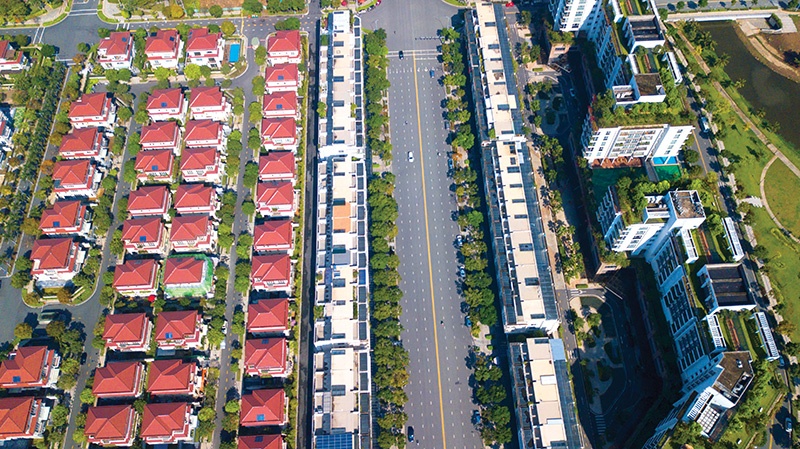Interest rates putting dampener on real estate
 |
| Swelling prices are preventing homebuyers from going through with transactions, Photo: Le Toan |
Nguyen Quoc Anh, deputy CEO of Batdongsan.com.vn, highlighted that the demand for property, particularly those for living purposes, still remains high despite the lingering pandemic.
“Over 90 per cent of people surveyed in recent research conducted by our firm express their ambition to purchase real estate/house in the future. More than half are looking to buy within the next two years. Ho Chi Minh City and Hanoi remain in the top spots as the hottest housing markets in the country, followed by provinces adjacent to these two cities.”
The biggest impediment for future homebuyers, notwithstanding, is associated with ballooning prices that continue to swell.
Additionally, homeowners also confront challenges such as income losses and concerns over an economic downturn.
Moreover, 53 per cent of respondents thought that the current house loan interest rate is too high, hampering their appetite and ability to purchase homes.
Su Ngoc Khuong, senior director of investment of Savills Vietnam, assessed that in general, higher interest rates exert an influence on input costs, thus minimising the competitiveness of local goods. In the real estate sector, when interest rates go up and expenses rise, real estate developers will have to raise prices in response.
“Consumers would have to feel the brunt when using financial leverage to purchase property due to the effect increasing interest rates will have on their income. This is a source of tension for purchasers,” Khuong said.
As the high rates have a detrimental impact on their ability to purchase property, customers will have to thoroughly consider whether to use financial leverage or not when making purchases in the real estate market, he added. “This puts a lot of strain on end-users. However, I believe that the rate hike is merely a technical matter of fiscal policy in the short term. The government is adamant about supporting enterprises through stimulus packages.”
SSI Research stated the deposit interest rate schedule has been on an upward trajectory in recent months, so banks could attract more spare money. Credit growth is outpacing deposit growth, placing commercial banks’ business operations under strain.
Given the economic openness when Vietnam signals its intention to fully resume international tourism, a robust hike in credit demand, and steadily escalating inflationary strain, SSI states that deposit interest rates have bottomed out and will begin to rise in the second half of the year. As a result, deposit rates will go up by 20-25 basis points as per the base scenario.
Likewise, VNDirect Securities anticipates a 0.3-0.5 percentage point rise in the deposit interest rate this year. Interest rates might rise as a result of greater demand for capital mobilisation as a result of immense credit and inflationary tension, as well as competition from alternative investment channels like real estate and securities.
According to research conducted by the BIDV Research and Training Institute, inflation is slated to be between 3.5 and 3.8 per cent this year. The deposit rate may fluctuate between 0.3 and 0.8 per cent, while the fundamental lending rate remains constant. This anticipated interest rate hike took into account the effect of the higher price of goods and services, as well as the government’s socioeconomic recovery and development agenda.
| Jack Nguyen - Senior investment management consultant
Rising interest rates will affect both investors and homebuyers. When the bank sets interest rates at a high level, the cost level of debt rises, then when the cost of debt rises, it will reduce people’s appetite to borrow and will slow consumer demand. Higher interest rates usually come from higher inflation, which is currently happening across the world. For the real estate sector, rising interest rates will prevent people from engaging in transactions. Buyers or individual investors who need to take on a bank mortgage to purchase a house, for example, will be hesitant to borrow or borrow more from the bank because of higher overall monthly repayments to the bank. As the cost of borrowing increases, homebuyers will naturally need to consider their monthly income and budget carefully before taking on a mortgage. In short, higher interest rates will make homebuyers much less affordable. Higher interest rates will have an impact on the real estate market in general. Developers that require bank financing to develop their projects will likely slow down or increase prices on their products. Both cases will not be good for both developers and buyers, as developers will not be able to sell their projects and homebuyers will not afford higher prices. |
What the stars mean:
★ Poor ★ ★ Promising ★★★ Good ★★★★ Very good ★★★★★ Exceptional
Related Contents
Latest News
More News
- Decree opens incentives for green urban development (January 24, 2026 | 11:18)
- Public investment is reshaping real estate’s role in Vietnam (January 21, 2026 | 10:04)
- Ho Chi Minh City seeks investor to revive Binh Quoi–Thanh Da project (January 19, 2026 | 11:58)
- Sun Group launches construction of Rach Chiec sports complex (January 16, 2026 | 16:17)
- CEO Group breaks ground on first industrial park in Haiphong Free Trade Zone (January 15, 2026 | 15:47)
- BRIGHTPARK Entertainment Complex opens in Ninh Binh (January 12, 2026 | 14:27)
- Ho Chi Minh City's industrial parks top $5.3 billion investment in 2025 (January 06, 2026 | 08:38)
- Why Vietnam must build a global strategy for its construction industry (December 31, 2025 | 18:57)
- Housing operations must be effective (December 29, 2025 | 10:00)
- Developers that optimise costs will win out in green transition (December 29, 2025 | 09:37)


 Tag:
Tag:




















 Mobile Version
Mobile Version